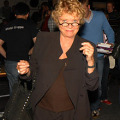How is it Possible?
Every year, billions of dollars are stolen or illegally laundered from African countries. Corrupt presidents and multinational companies use tax havens to cover up their transactions. "It is the worst thing to happen since slavery," said Eva Joly, who was a guest at NHH on Thursday, the 4th of September
13.09.2007 - Kristian T. Marthinsen

Eva Joly took on the daunting task of fighting money laundering, which she recently spoke about at NHH.
Norwegian Agency for Development Cooperation's (Norad) special advisor explained that last year four billion dollars from Nigeria and at least one billion dollars from Kenya went missing. That same year, Norway gave three billion dollars in foreign aid to developing countries.
"How is it possible?" asked Joly to the students in the audience. "How is it possible that the son of Kenya's president can travel to London and buy homes for millions of pounds without any questions asked? The fact that we just sit and watch is unbelievable."
Invisible Owners
At NHH, Joly spoke about corruption and how tax havens hinder development.
With the use of lawyers and so-called trusts, private entities can open companies in Jersey, the Cayman Islands and other similar places. There is protection for these invisible owners and their identities, and it is nearly impossible to find out who is actually behind the companies. These greedy investors buy and sell shares without paying the tax on the profits. According to Joly, this corrupt behavior is something that multinational companies and dictators often engage in.
Norway is one of 40 countries taking part in the Financial Action Task Force (FATF). The intention of the FATF is to "fight the laundering of money and financing of terrorists". FATF has 49 regulations in place which hinder the laundering of money.
Many of the closest neighboring countries do not observe the regulations that were established in 1990.
"The United Kingdom does not enforce FATF's regulations in regards to money laundering. They do not supply information in accordance with the international standards, and they get away with it," explained Joly.
Sitting on a Bomb
Joly believes that it is a shame that firms and private entities use tax havens in order to avoid paying tax.
"It is normal to pay tax. It is disturbing to think that one would not have to pay tax when one actually should. The 20% richest entities own 90% of all the valuables in the world. This is an ever increasing problem and it is a bomb that we are all sitting on," she says. Joly goes on further to explain how multinational companies exploit established agreements with African countries.
"In Africa, all of the exports are under priced, yet at the same time all of the imports are over priced. This imbalance accounts for nearly one billion dollars annually. It is 10 times more than the entire world gives annually in aid to developing countries."
According to Knut Johannessen Ims, a professor of ethics at NHH, there could be several reasons for this imbalance.
"The under pricing of exports in African countries may be due to African exporters asking for commission on exports and also because the exporter is actually receiving the correct and fair price on the international market. However, the exporter's accounts usually show a lower price. This difference in price goes directly into the pockets of the exporters who avoid taxation and place the laundered money in Western countries, in places such as London or other financial hotspots. These investments can be seen in the form of real estate or investments in banks," explained Ims.
The professor insists that it is also possible that African imports are priced too high. Therefore, the accounts of the importers show that they have been paying a relatively high price, where as in reality they have purchased the goods cheaper. This monetary difference is then laundered and placed in real estate in Western countries.
Who purchased the Hydro-shares?
Ims adds that the reality often surpasses the fantasy in these situations. There is a never ending amount of creative ways to bribe another party, and this triggers a chain of illegal actions.
"To begin with, the receiver has to launder the money and it is likely that the receiver will say that he has won money from playing poker, horse racing or the lotto. He then uses this money to buy shares in reputable firms, banks or insurance companies in South America, Asian finance centers, or in Western countries. In Norway, we remember the corruption scandal within Statoil that occurred a few years ago, where the son of the former Iranian president received over 100 million kroner into an account in a tax haven," explained ethics professor Ims.
At Statoil, the bribery money was covered up and recorded as consulting fees. However, internal auditors within Statoil noticed that something strange was going on when they saw the unusually large amount of money allocated to the consulting fees account.
Joly feels that the Norwegian system is well-regulated, but that the possibility to trade shares and real-estate through tax havens is also present here at home. She strongly insists that the only one who does not believe that Norwegians purchase and sell shares through tax havens is Kredittilsynet (The Financial Supervisory Authority of Norway).
"We know that such accounts have been used by Norwegians, but we are unable to prove this at this point in time. It would have been very interesting to find out who actually purchased Hydro-shares," said Joly.
------------------------
Eva Joly offered some practical advice to the NHH students who sat in the audience. In addition to distancing herself from corruption and work done under the table, she encouraged others to do the same. She also recommended several books for those who were interested in further exploring the topic.
Translated by Nancy Cavanaugh
|

